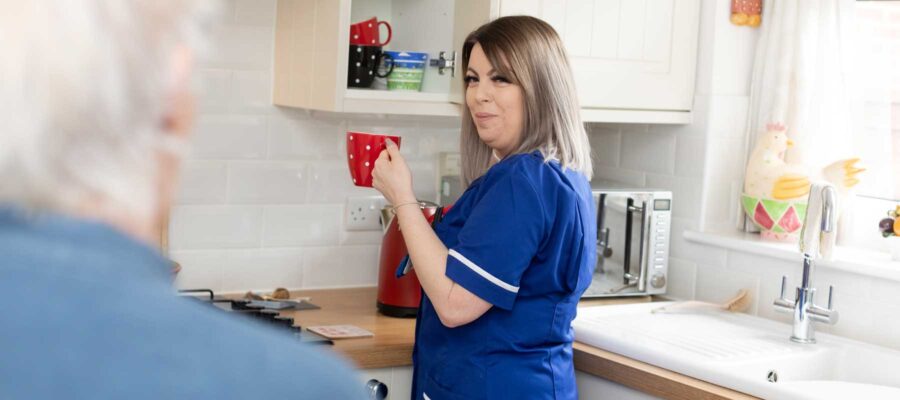Understand the eligibility criteria for domiciliary care funding and how to apply for support at home from your local authority.
Introduction to Domiciliary Care
Domiciliary care, or homecare, is essential for many people who want to stay in their own homes while receiving the help they need with daily activities. This support can range from assistance with personal hygiene and meal preparation to help with medication management and mobility. If you or a loved one requires domiciliary care, you may be wondering: who qualifies for domiciliary care?
In this guide, we’ll provide an in-depth look at the eligibility criteria for domiciliary care funding, the financial and care assessments involved, and other options you can explore. We’ll also point you to external resources, like the NHS and Citizens Advice, where you can find more detailed information and assistance. By the end of this guide, you’ll know how to apply for domiciliary care funding and what other support may be available to you.
What is Domiciliary Care?
Domiciliary care refers to the support provided at home for individuals who need help with daily tasks but wish to avoid moving into a care home. This type of care allows people to remain independent, living in familiar surroundings while receiving assistance with tasks such as bathing, dressing, housekeeping, and even help with managing long-term health conditions.
This service is ideal for elderly individuals or people with chronic illnesses or disabilities who still want to live at home but need support to manage daily life. The cost of domiciliary care varies depending on the individual’s needs, but funding may be available through the local authority for those who meet specific eligibility criteria.
Eligibility Criteria for Domiciliary Care
Eligibility for domiciliary care is determined by a combination of care needs and financial means. Below is a detailed breakdown of the factors that affect eligibility:
1. Care Needs Assessment
The first step in determining whether you qualify for domiciliary care is a needs assessment. This assessment is carried out by your local authority to evaluate the level of care you need. The assessment considers several factors, such as:
- Your ability to carry out daily activities independently, such as bathing, dressing, eating, or using the toilet.
- Your mobility, and whether you need help with walking, moving in and out of bed, or using a wheelchair.
- Your mental health, including conditions like dementia or depression.
- Whether you need assistance managing long-term health conditions like heart disease, diabetes, or arthritis.
The needs assessment is designed to ensure that only those who genuinely require care receive funding. You can learn more about the assessment process through Citizens Advice. If you’re not sure where to start, you can contact your local authority directly to arrange an assessment.
2. Financial Assessment: Assets and Income
Once your care needs have been assessed, your local authority will look at your financial situation to determine how much you can contribute to the cost of care. This is known as a financial assessment.
Assets
The amount of assets you have plays a major role in determining whether you qualify for domiciliary care funding and how much you’ll need to contribute. The key figures for assets are:
- If your assets are £14,250 or less, you may be eligible for full funding.
- If your assets are between £14,250 and £23,250, you may qualify for partial funding.
- If your assets exceed £23,250, you will likely be responsible for covering the full cost of your care.
It’s important to note that assets include savings, property, investments, and other financial resources. However, your primary residence is generally not considered part of your assets for the purposes of this assessment, unless you are planning to move into residential care.
You should also be aware that transferring or gifting assets in order to reduce your wealth is not allowed and can affect your eligibility for funding. Local authorities have strict rules about this, and any attempt to deliberately avoid paying care fees could result in the withdrawal of financial support.
Income
In addition to assessing your assets, the local authority will consider your income when determining how much you can afford to pay for care. This includes pensions, income from benefits, or any earnings you might have.
If you have a low income, you may qualify for full or partial funding, even if your assets are above the £14,250 threshold. For more detailed information on what income is considered, visit NHS Financial Support.
3. Applying for Domiciliary Care Funding
To apply for domiciliary care funding, you should contact your local authority to arrange for a needs assessment. The local authority will assess both your care needs and your financial situation to determine what type of funding, if any, you qualify for.
Once the assessment is completed, you will be informed whether you are eligible for funding, and if so, how much you will need to contribute. If you’re eligible for partial funding, the local authority will provide support to cover some of the costs of care, but you will need to pay the remaining amount.
4. Other Options for Care
While domiciliary care may be the most common option for people who need help at home, there are other care options available, especially for individuals with more complex healthcare needs.

NHS Continuing Healthcare (CHC)
For individuals with serious or complex health conditions, NHS Continuing Healthcare (CHC) funding may be available. CHC provides free healthcare services to individuals with substantial care needs. It is typically provided to people who have long-term illnesses such as motor neurone disease, advanced dementia, stroke recovery, or complex physical disabilities.
The eligibility for CHC is determined through an extensive assessment based on four key indicators: nature, intensity, complexity, and unpredictability. A positive checklist from this assessment means you will be eligible for a full CHC assessment. To find out more about CHC eligibility, visit the NHS CHC page.
Reablement and Intermediate Care
If you’ve recently been discharged from the hospital or are at risk of requiring hospital care, you may be eligible for intermediate care or reablement services. These services typically last for up to six weeks and are designed to help you regain your independence after an illness or hospital stay. The services are free in most cases and are intended to support you in recovering and maintaining your ability to live independently at home.
How Much Savings Can You Have Before You Have to Pay for Care?
If your savings exceed £23,250, you will be responsible for paying the full cost of your domiciliary care. This includes both the cost of the care itself and any other related services. However, if your savings fall below this amount, you may qualify for partial or full funding, depending on the results of your financial assessment.
What is a Positive CHC Checklist?
A positive CHC checklist indicates that you meet the criteria for a full assessment for NHS Continuing Healthcare (CHC). This checklist helps to identify whether you have the necessary needs for CHC support. However, a positive checklist does not guarantee eligibility, as a more thorough evaluation is conducted afterward. More information can be found in the NHS Continuing Healthcare Framework.
O’Shea Healthcare Services
At O’Shea Healthcare, we are committed to providing high-quality domiciliary care services tailored to the needs of individuals who wish to remain at home. Our services include assistance with personal care, medication support, household tasks, and more, ensuring that our clients can live comfortably and independently in their own homes. If you are interested in finding out more about how we can assist with domiciliary care, please visit our website or contact us directly.
Conclusion
In summary, qualifying for domiciliary care funding involves both an assessment of your care needs and a financial assessment. If you have assets under £14,250, you may qualify for full funding, while those with assets between £14,250 and £23,250 may receive partial funding. Those with higher assets typically must pay for care out-of-pocket.
If you require complex health services, NHS Continuing Healthcare might be an option, as this funding covers the full cost of care for individuals with high healthcare needs. Additionally, you may be eligible for reablement services after a hospital stay.
By understanding the eligibility criteria and applying for assistance, you can find the right care options for yourself or your loved ones. For more information, explore external resources like Citizens Advice and the NHS, or contact O’Shea Healthcare to learn more about our services.



